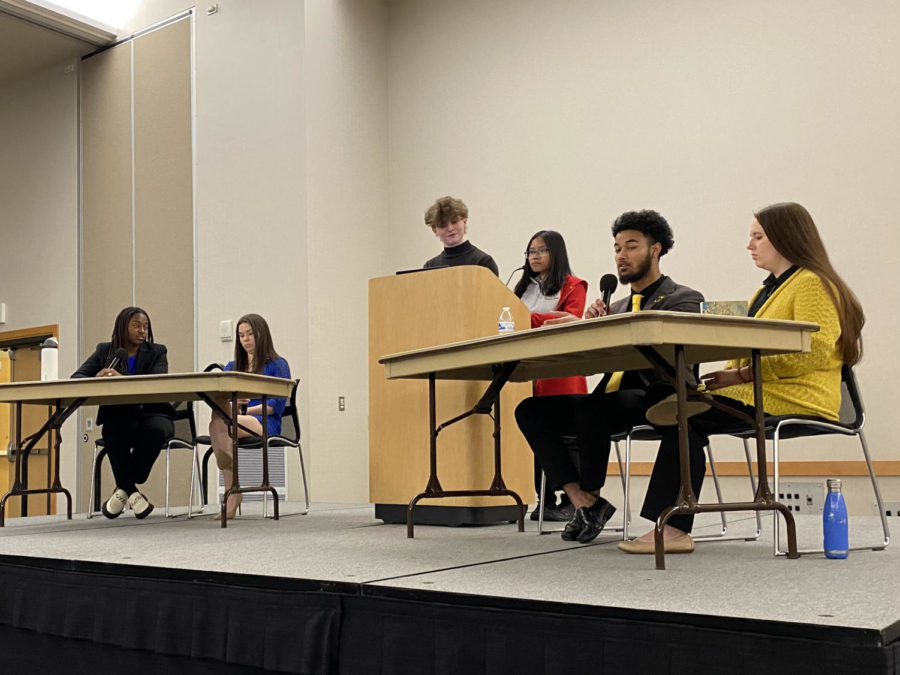Presidential candidates state their cases at SGA Presidential Debate
March 28, 2023
The SGA Presidential Debate took place Tuesday evening in the Student Union, with the two slates—Isaiah Phillips and Lucy Burns, Ragan Savage and Gracie Copfer—declaring their plans for the SGA president and vice president positions the two sides are vying for.
The debate began with the introduction of the candidates and their platforms. Vice presidential candidate Copfer was not present for the first 10 minutes of the debate, citing that she was supporting NKU Athletics in Louisville beforehand.
Both sides hope to vitalize student culture by getting people involved and supporting groups that tend to be overlooked.
Phillips and Burns are eager to introduce an educational program they called Cultural Competency Training, which they said would teach students about diverse student identities and help SGA identify distinct issues impacting students that may go unrecognized by people removed from certain cultures. The duo plans to advocate to embed the training in UNV 100 courses.
Phillips and Burns also plan to create a centralized Instagram account called WaysToEngageNKU that would highlight the different ways to get involved on campus and unite the niche communities that they argue compose the campus populations.
A similar sentiment was shared by Savage and Copfer, citing how sometimes there are so many events that students feel lost.
“The main thing we’re hearing is that students don’t know about events, they don’t know where they’re at or some are even saying there’s too many events,” Savage said. “So our goal is to create an Instagram where everyone can see all the events that are happening and so we can continue to stay engaged.”
Savage and Copfer agreed that the campus community should be united, which they envision doing through inclusive events that connect the various communities in one spot and build student enthusiasm. Heightening excitement for campus-wide events that typically appeal to subsets of students, like athletic events and arts showcases, is another way they hope to see boosted engagement.
Savage and Copfer also plan to increase support for commuter students, who make up a considerable segment of the student body. The slate said they will work to arrange a commuter students lounge for students to hangout while on campus.
Burns responded that as a commuter student herself, she prefers to sit in more public spaces like her sorority table or the Honors College lounge.
“Engaging across different communities instead of further siloing them in their own spaces would be one way that we would kind of tweak [Savage/Copfer’s campaign],” Burns said.
Being elected SGA president comes with a seat on the Board of Regents, which could prove to be crucial in the search for a new university president. The Board of Regents approves the appointment of the university president as well as major changes like tuition or housing prices.
Both Phillips and Savage spoke to the honor it would be to serve as a regent, but Savage maintained that her focus is on the student body.
“At the end of the day, it’s not so much about the title but it’s about the students,” the theatre major said.
Savage and Copfer are both transfer students. Savage previously attended Muskingum University and Bowie State University. Journalism major Copfer transferred from Ohio State University. They argued that their collective experiences at other colleges provide exposure to different leadership styles that will help them identify and voice desirable attributes for an incoming president.
Phillips and Burns retorted this by stating that they both started their college careers at NKU, saying that the experiences and connections they’ve gathered will be instrumental to them serving the students duly.
“NKU has its own set of problems compared to other universities,” Phillips responded.
A claim made by Copfer and Savage that they would work to lower on-campus housing rates stood out to the audience, sparking some skepticism about the viability of the initiative. Copfer said she has been mobilizing students to reach out to alumni for donor support to help alleviate pressures of housing costs, especially amid reduced scholarship offerings.
When the floor was opened for audience members to address questions to the candidates, Vice President of Student Affairs Dr. Eddie Howard asked the slates how they would plan to recruit and retain senators. A common hurdle SGA faces is lacking the senators needed to reach quorum—half of the minimum working number of 25 senators—which allows senators to propose and pass resolutions. The threshold is often attained late in the semester, limiting the organization’s ability to implement lasting change.
Phillips and Burns responded that the current culture within SGA is friendly and productive. Burns attributed this to current SGA President Daniel Myers’ engaging and encouraging leadership style that they hope to continue. She added that in recruiting new senators, the duo will seek to highlight how students can make positive change and evoke their passions, rather than just build their resume.
“We want to create these opportunities in which students can cultivate their passion, whether they’re vocal, whether they’re quiet… more of directing toward these outlets they’d like to see here at NKU,” Phillips said.
Copfer and Savage iterated the importance of disseminating what the roles of being a student senator has in store, saying that getting people excited for the change they could potentially contribute to could entice students. They plan to do this through increased tabling presence and emphasizing SGA’s “Boots on the Ground” questions to foster regular interactions between SGA members and the general student body.
At the end of the night, Dr. Howard challenged the slates by asking what they hoped their one accomplishment or legacy would be. Their answers were decisive. Phillips/Burns: Cultural Competency Training. Savage/Copfer: Reinstating Norse rates.
The recorded debate can be found at The Northerner’s Instagram account. Voting will open at 8 a.m. March 29 and close at 10 p.m. March 30.

